Prince Originals: exclusive interview with muse and collaborator Susannah Melvoin
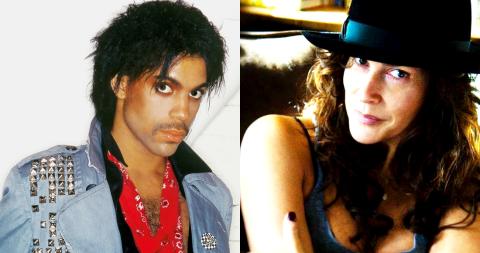
Many years before Prince passed away in April 2016, his fans had long hoped that his famous musical archive - The Vault - would be unlocked and their treasures released to the world. Naturally, since his premature passing, that clamour has become almost deafening.
And in the past year, the treasures have started to emerge. First, last September, Piano & A Microphone brought an album-ful of 1983 demos to the world, including incredible, stripped back versions of Purple Rain, among other gems. And this week the latest archive instalment has arrived, in the form of Originals. For fans of peak era Prince, both albums are an utter joy.
Originals (which is this week on course to enter the UK's Official Albums Top 40) is based on a concept which few other artists in history could deliver - a compilation of 14 original Prince demos from the most creative period of his career which have never been released, but which, as songs, were subsequently made famous by other artists.
One of the many things that everyone knows about Prince is he was among the most prolific artists of all time, who through large swathes of his career spent every waking hour in the studio. Such an abundance of output meant he could also afford be among the most generous too, handing smash hits and (in some cases) entire albums to other artists. See Prince's full official Chart history, including 40 Top 40 singles and five Number 1 albums
Among the cuts on Originals are his very own original versions of UK Number 1s Manic Monday and Nothing Compares To U (for The Bangles and Sinead O’Connor respectively), as well as gems which had only previously been released as covers by the likes of The Time, Sheila E, Jill Jones, Kenny Rogers, The Family and Martika.
Now the highly prolific, creative colossus is no longer with us, few people are better placed to talk about him and his music than Susannah Melvoin. Melvoin, the twin sister of Wendy & Lisa’s Wendy, is a woman who was, through the years of Prince's early Eighties creative peak, his backing vocalist, his sometime songwriting partner, his muse, his partner, member of The Family - and the woman about whom Nothing Compares To U was apparently written.
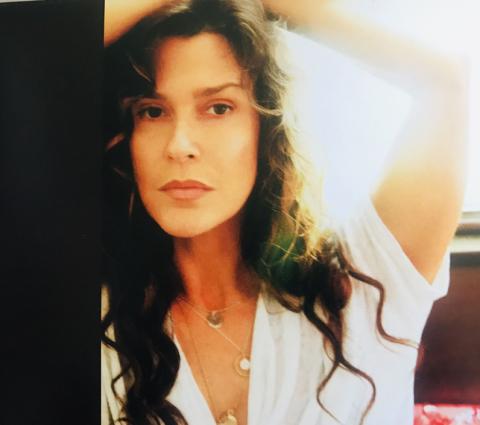
Susannah Melvoin
So, Susannah, how did you first meet Prince?
I met him at a Christmas party that Warner Bros was holding during the 1999 tour. He was in Los Angeles, I was right out of high school working for David Geffen as a receptionist for Geffen Records. That Christmas, little teenage Susannah was invited to go to the Christmas party so I got myself all dressed up and ended up at this party - and there was Prince and Vanity at the entry way of this party.
I called my sister (Wendy) and Lisa, because they had already been working with him and said, “Prince is here, should I go say something to him”. As I finished my phone call I was finding my way to Prince, I could see him looking at me, looking at a face he kind of recognises, because obviously I am a twin to Wendy. I was walking closer and you don’t normally get that close, I said "my name is Susannah, I’m Wendy’s twin sister."
He kind of gave me a sweet smile. He didn’t say much and it was three weeks later that he was back in Los Angeles and starting to record the Purple Rain stuff. He came back and they were doing the Little Red Corvette video shoot, I went down to visit the shoot. And that was the inception of me getting to know everybody.
Wendy & Lisa, Vanity, Apollonia, Sheila E and yourself - Prince was very supportive of female musicians wasn't he?
Yes he was. I think he felt less competitive with females. I can’t say this for sure, but his relationship with men was different. I didn’t see him be vulnerable with men, but he could be vulnerable with women. Being in a vulnerable place is a better way to be artistic, to be yourself. Women brought that out in him, particularly women who were of great talent and who could hold up their own in a studio and record. There’s some extraordinarily gifted singers, players and songwriters who he worked with. And again some of the women weren’t necessarily musicians or players, but they were creatives and he gravitated towards that. I think he felt empowered by that.
How important was he to your career?
Hugely important to me. I first started in this industry working for David Geffen, but at that same time I had also auditioned for Quincy Jones and got this big gig. Out of 1,000 vocalists in an audition I got this gig singing for him in this a capella group, which included Siedah Garrett and Kevin Dorsey, all these people who’d worked with Michael [Jackson].
So I’m working with Quincy Jones at the same time Wendy & Lisa are working with Prince. And I would go to sleep wishing.... I can't be ungrateful here because I worked my ass off to get this job with this really generous, lovely man Quincy Jones and his vocal coach Tom Bailer. I didn’t want to screw up my relationships, I didn’t want to be that person. But Prince would come and stay in our house in West Hollywood. And one day Wendy and Lisa were singing at the kitchen table with him and I was in my room and I heard Wendy say, “Let's play Prince the demo that you got the gig with Quincy with." I was, “No please don’t.”
I had done an Aretha Franklin cover and they played it for Prince. And I came back into the kitchen and he said, "You want to come sing with us, you wanna be with my family.” And that was it. I looked at him and I said, "I would love that." But I didn’t know how to tell Quincy, I didn’t know how to deal with that, I'd worked so hard to get to this place, I was only 18 years old… And Prince walked me through the whole thing. He said, “I'll help you. You first have to call Quincy.”
So I called Quincy that night and I told him what had happened, I started to get very weepy and I said, “I am struggling so hard, because you’ve given me such a great opportunity to do what I love to do and here I am saying I don’t know if I want to do this with you, I’d rather be doing it with someone else.”
And Quincy made it really easy for, he just said, “Sweetheart, if you can’t sleep at night because you need to be somewhere else, then you need to be somewhere else. I’d do it too.” So he gave me his blessing and I went to Prince said, “He’s absolutely fine about it." And Prince went with me the following week to my attorney’s office to help get out of my deal that I had signed, Prince came with me, into the office, just the two of us, and we got out of my deal and that was it and it was, like, “You’re working with me now and you’re going to be with my family."
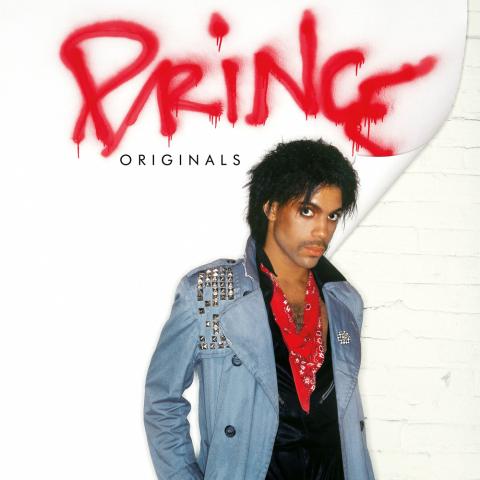
The cover for the new Prince Originals album, which contains rare and unheard demos of songs that became big hits for other artists.
What was the creative process with Prince like, how did he work, how did he write?
I can only speak for myself because everyone's experience working with him was different. Because I was not just working with him, I was also emotionally involved with him, so my time with him was very very immersed. My immersion into our life together and also creative life together became intertwined.
He was a prolific creator. He wasn't a communicator. He didn’t hang out with people, it wasn’t, like, “let's go for wine," there was none of that. This is a man who, when it was time to wake up, it was “Call the engineer, go into the studio, roll tape”, and he was there until it was finished. An entire track would start from the basic tracking to mastering within a 36 hour period, maybe 48. That was one reality.
The other reality was that if you were very involved with him musically, you could be in the studio with him and there wasn't a lot of talking, the Linn drum machine would come out, he would start working on patterns and then roll tape. He was an unbelievably talented engineer as well, self-taught so much of it. So before digital editing, he could go over to the tape machine when he was doing a basic drum track and he could play with the tape and hear the perfect splice, he would cut, he would splice it together and then go on again and play the tape when it had the right rhythmic connection. He was playing with things.
He didn’t mind you if you were very close to him watching him. I think part of it was that he wasn't pretending to be anything else, he was probably very happy to have you watch him be a genius. He probably got a bit puffed up about it. [laughs]
Then he would sit back down at the board, it wasn't going out into the main room, and he would get the keyboard sounds together, then the bass, then the guitar, then it would be, “Okay, it’s time for vocals". Then he would go into the main room, get his notebook out and start to write lyrics. All of this was in his head, he knew exactly what he was doing.
And then when it was time to do the lead vocal, everyone would have to leave, it’s time to go. It would usually be just him, everyone out, including the engineer. And he would go and do his vocal, he would pull the mike down sitting there and he would do his vocal at the board. That happened a lot. That was if he was at a recording studio, at this time I’m talking about Sunset Sounds [in Hollywood].
Later on when he had the Warehouse [in Minnesota], Eden Prairie [in Los Angeles], things started becoming… it's hard to find words to express to you… his prolific creative output... he was like a portal.
Studios had to be up and running constantly, mobile studios, the Warehouse, to studios where he would be flying to, there was never a moment when he was not working and recording music.
When it comes to my experience with him, I would be with him and he would say these are the background vocals and I would go in and sing the background vocals, or he would leave and go and eat after he had finished all of his basic tracking and I would be left with Susan to do my background vocals on the track that he had left me with. So I’d have some autonomy when it came to things like that, I could sing my vocals by myself a lot of times. And a lot of times I would sing them with him.
MORE: The music lives on – the biggest posthumous chart successes
Can you tell us how you came to write Starfish & Coffee with him (the sixth track on Prince's seminal 1987 opus Sign O' The Times).
I'm actually the co-author of Starfish & Coffee. Although I do sing background vocals, I didn’t come up with the melody. The lyric is really an amalgam of what I wrote.
It was a morning in Minnesota, we’re at the kitchen table, I had spent a lot of time the previous couple of years telling him a story about a girl Wendy and I both went to school with. I still know this girl to this day, Cynthia Rose, she’s still my friend. But we didn’t know at the time that this extraordinary young life was on the spectrum.
I would tell Prince on many occasions, when we would go for our drives or we would spend time alone together, a lot of times driving around Minneapolis, or getting something to eat, something would come up and he would ask what was this thing with Cynthia Rose.
One morning he asked Susan [Rogers, Prince’s favoured engineer] to come over, we had just moved into our home, on Galpin, we had finished our recording studio at home. He came up to me at the kitchen table and said, “Can you do me a favour, can you write down everything you’ve told me about Cynthia, everything that you can remember what she did, where you were, just things that would give me the story.”
So I did, I wrote this all out and handed it to him. And he’s looking it over and... [laughs].. Cynthia would say things like, “You know what I had for breakfast? I had Starfish and Pee Pee.” Those were the kind of things that would make Prince howl with laughter.
But when I wrote it he came to me and he looked at me and he said, "You know I can't sing that word... I've got to change the word. He was choking the word out. I’m not going to sing Starfish & Pee-Pee.” So I said, “You gotta do what you gotta do." So, he turned it into "Starfish & Coffee", that’s his brilliance.
So he went downstairs, laughing and howling at the whole thing. And 10 hours later, Susan came upstairs and said, “He’s done, he wants you to hear it”. And I went down and he was standing at the board and pressed play and there was Starfish & Coffee. And I was like blown away.
But the brilliance of that song, that he could turn a phrase that way? You know one of his greatest gifts as a songwriter was being able to turn phrases that way, to find a correlation between one line to another and have everything wrap up beautifully. He could do that.
When he found "Starfish & coffee", he knew "maple syrup and jam, butterscotch clouds, a tangerine, a side order of ham”… was the next line. That's a fluid, imaginative, creative state that just came right out him. And he left to have a shower and do his thing and I sat down at the board with Susan and did the background vocals.
Is there any track or pieces of his music that you love the most?
There’s no track that I love more than any other, because it's so layered. But what I can say is that the period of time that I was enmeshed with him and we were a unit on so many levels, and I was able to sing on so much of this really fluid body of work that he wanted me a part of.
This particular time, [we worked together on] The Crystal Ball [a legendary unreleased album of material, much of which ended up on Sign O’ The Times]… it was going to be a double album, everything was going to be a double album because the music was just flowing out of him. That was a really emotional and creative experience for me, for many reasons, because he was asking me to be super vulnerable on tape, to play a character, he was asking me to basically do me.
He was giving me the opportunity to be his equal on something, vocally. It may not sound that to the average listener, but my experience of that whole recording for days on end and what his release was at the end when it was finally finished and mixed. He was so proud of that and beaming with joy that we had done it together. There was something about it that he felt like, "look what we’ve done". That to me, during that time, meant a lot. It meant a lot that he was trusting me to go into that place with him.
And I use the word immersion, because it really was, you just go in and you just hang on to the tail of the comet, you really do, and if you let go you just fizz out and you’re not going to keep up. But you got to keep up.
He was very loving and very generous, but you had to work hard. You had to be ready to work.
MORE: Songs that under-performed on first release before becoming hits, including Prince's 1999
Crystal Ball was an album which, when it originally evolved, included a lot of tracks which subsequently turned up on Sign O’ The Times album didn't they?
Yes, that’s exactly right. We had been recording a huge number of tracks. It was Sign Of The Times, it was the Dream Factory, it was Crystal Ball, it was the Black Album, it was The Flesh, that’s five records that were all being recorded at the same time and there’s all that music - and I’m on all of that.
And a lot of that material still is yet to see the light of day, isn’t it? And Originals is an album of tracks that we haven’t heard before too. Are there any particular recordings that you would love to see people hearing?
There’s so much of it. But I’m partial and forgive me my partiality, but every incarnation of Prince's musical life has a group of extraordinary players and musicians and everyone will give you another answer. I have no definitive say on any of it, only my experience.
But what I can say is that Wendy & Lisa were a very very important part of Prince's creative life and the music they recorded and worked on with him I think deserves to be heard. It deserves to be heard where Wendy & Lisa can be stewards and producers of a record that they had done with him. There’s so much of it and being heard that way and maybe even remixed and offered to the fans... I think that deserves to be heard and I wish the music of that particular period was heard in context.
Of all the tracks on Originals, which are you most happy to be finally available?
Really, I love Dear Michaelangelo. That's the one for me. I love the musical arrangement of it and I love his vocal, the original vocal on it, it’s complicated, it uses chord structures that ring deeper to me, and it has a beautiful depth to it.
You have talked about Prince as being like a portal, and the way you talk of his creativity, as if he was channelling something, almost as if he was somehow spiritual. Do you believe that to be the case?
I think you’re absolutely right and I do believe that Prince was a unique man in that he could access the creative energy better than most people I have ever known. Karl Jung used to speak of that unconscious imaginative state where you can access parts of your inner world in a way that could dictate the outer reality and Prince had that ability. I think he lived in his imaginative, creative state, the inner world, 24 hours a day. When I talk about that portal, that creative energy that was constant, he wasn't a communicator.
His way of communicating was through his art. Nothing Compares 2 U was a dialogue he was having. When I got that track, the longing and the need and the way that he communicates in that song, I knew who he was talking to. And when I got to sing on that and send my vocal back to him, it was my way of singing and communicating back to him.
The song has been said to have been written about me, I do believe that. I also know that it was about the woman who he was working about at the time, Sandy Scipioni, his assistant, and her father had passed, so she left. So he was having all these feelings of longing and need - and Nothing Compares 2 U was written out of longing and need.
He was an extraordinary artist. So many of us think we are singer songwriters and in any city of songwriters anyone knows that some of us are never going to achieve it. It’s just not going to happen. We don’t have the amalgam of star quality, musical and emotional intelligence. Just wanting it doesn’t work. Prince was completely alone in that he had an abundance of it all. He was writing, recording, switching musical gears, it was a gift.
MORE: Prince's Official Top 20 biggest hits in the UK
Aside from Nothing Compares 2 U, there is another song he wrote about you that we are never going to hear, isn't there? It's called Wally, right?
Yes. He gave it the name Wally, after Wally Safford, one of his dancers on the Parade tour. It's completely gone, it’s nowhere anywhere. And it's the only song that Susan knows of that he actually forced her to erase the tape never to be heard again. He went in a week later and re-recorded it and Susan says it was nothing like the original. He was heartbroken, I had left him, I wasn’t coming to come back to Minneapolis. He went in the studio recorded this song and Susan, from her experience, said it was the most beautiful love song that he had ever written. It so powerful and so beautiful that he had to erase it, it was too vulnerable. Susan says it was just heart-breaking, the most beautiful song he had ever written. And he was just, “Erase it, get rid of it.” She was like, “Do we really have to, can we just keep it, maybe you’ll feel differently…” And he was, “Nope, erase it.” And he made her get rid of it.
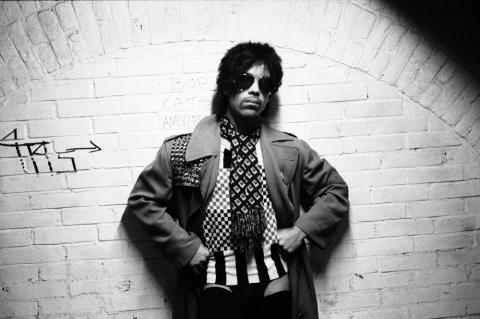
You obviously had an incredible connection with Prince. It must be tough talking about all of this history?
It's not tough. I don’t deny my history. I don’t find it difficult to talk about him. For the most part I'm really okay, I feel as long as its based on my experience. I don’t speak for anybody else and I wouldn’t want to do that. I don’t know how other people feel. None of it is based on anything but my own experience of my life with him.
How do you feel about the huge outpouring of love and admiration for him since he went?
I get it because I felt that way when Bowie died. When Bowie died, I felt like a huge part of me died with him. That history of my growing up and how I identified myself as an artistic person was through my musical experience of Bowie.
Even now, my kids are huge Bowie fans, when they put on Diamond Dogs, I’m up in their room saying, “Isn’t that just the best fucking record you’ve ever heard?”. I feel like I'm 14, 13. When I first heard that record I was 10 and it was the greatest record I ever heard.
I get that, I get when fans miss the person that finally speaks to that inner part of our lives, the inner world. Music and art speaks to our inner life. It's how we develop who we are on the inside. And when that person leaves, we are only left with what has made us what we are up until that moment and then we’re left to figure it out on our own now. Like how do we finish the story?
I suppose part of what I do is to help have a continuum of how to finish the story. And how to be okay when the inner teacher is silenced.
I get it, I get that the people are like, is there anything about the man that you can tell us? I can tell you that through my experience, he was just whatever you wanted him to be and he will continue to me.
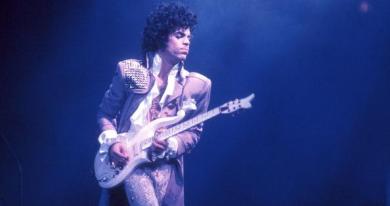
Join the conversation by joining the Official Charts community and dropping comment.
Already registered?
Log in
No account?
Register